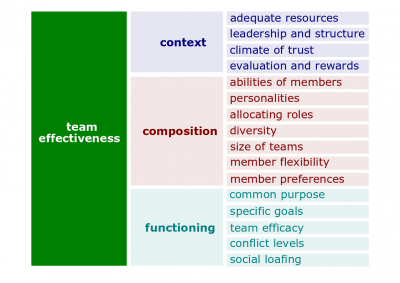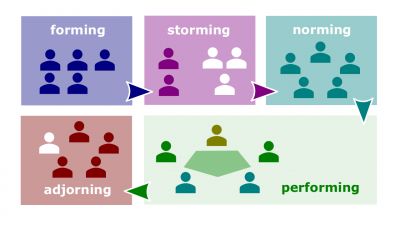Difference between revisions of "OB team concepts"
| (4 intermediate revisions by the same user not shown) | |||
| Line 1: | Line 1: | ||
| − | [[OB team concepts]] are those [[concept]]s that are related to [[ | + | [[OB team concepts]] are those [[concept]]s that are related to [[workteam]]s researched in [[organizational behavior]] studies. The concepts below are taken from [[Organizational Behavior by Robbins and Judge (17th edition)]]; [[Septem Artes Administrativi]] served as the primary source of illustrations. |
| − | == | + | ==Workteam== |
| − | *[[File:Team-effectiveness.png| | + | *[[File:Team-effectiveness.png|400px|thumb|right|[[Team effectiveness model]]]][[Workteam]]. A [[group]] whose individual efforts result in performance that is greater than the sum of the individual inputs. |
| − | *[[Problem-solving team]]. A [[ | + | |
| − | *[[Self-managed | + | ==Types of teams== |
| − | *[[Cross-functional team]]. A [[ | + | *[[Problem-solving team]]. A [[workteam]] of 5 to 12 employees from the same department who meet for a few hours each week to discuss ways of improving quality, efficiency, and the work environment. |
| − | *[[Virtual team]]. A [[ | + | *[[Self-managed workteam]]. A [[workteam]] of 10 to 15 people who take on responsibilities of their former supervisors. |
| + | *[[Cross-functional team]]. A [[workteam]] of employees from about the same hierarchical level, but from different work areas, who come together to accomplish a task. | ||
| + | *[[Virtual team]]. A [[workteam]] that use computer technology to tie together physically dispersed members in order to achieve a common goal. | ||
| + | |||
| + | ==Team system== | ||
*[[Multiteam system]]. A collection of two or more interdependent teams that share a superordinate goal; a team of teams. | *[[Multiteam system]]. A collection of two or more interdependent teams that share a superordinate goal; a team of teams. | ||
| + | |||
| + | ==Team characteristics== | ||
| + | *[[File:Group-development.png|400px|thumb|right|[[Tuckman's model]] of [[group development]]]][[Team cohesion]]. A situation when team members are emotionally attached to one another and motivated toward the team because of their attachment. | ||
*[[Reflexivity]]. A team characteristic of reflecting on and adjusting the master plan when necessary. | *[[Reflexivity]]. A team characteristic of reflecting on and adjusting the master plan when necessary. | ||
*[[Team efficacy]]. A team's collective belief that they can succeed at their tasks. | *[[Team efficacy]]. A team's collective belief that they can succeed at their tasks. | ||
*[[Team identity]]. A team member's affinity for and sense of belongingness to his or her team. | *[[Team identity]]. A team member's affinity for and sense of belongingness to his or her team. | ||
| − | |||
*[[Mental model]]. Team members' knowledge and beliefs about how the work gets done by the team. | *[[Mental model]]. Team members' knowledge and beliefs about how the work gets done by the team. | ||
| + | |||
| + | ==Team development== | ||
*[[Team building]]. High interaction among team members to increase trust and openness. | *[[Team building]]. High interaction among team members to increase trust and openness. | ||
Latest revision as of 19:53, 20 December 2019
OB team concepts are those concepts that are related to workteams researched in organizational behavior studies. The concepts below are taken from Organizational Behavior by Robbins and Judge (17th edition); Septem Artes Administrativi served as the primary source of illustrations.
Contents
Workteam
- Workteam. A group whose individual efforts result in performance that is greater than the sum of the individual inputs.
Types of teams
- Problem-solving team. A workteam of 5 to 12 employees from the same department who meet for a few hours each week to discuss ways of improving quality, efficiency, and the work environment.
- Self-managed workteam. A workteam of 10 to 15 people who take on responsibilities of their former supervisors.
- Cross-functional team. A workteam of employees from about the same hierarchical level, but from different work areas, who come together to accomplish a task.
- Virtual team. A workteam that use computer technology to tie together physically dispersed members in order to achieve a common goal.
Team system
- Multiteam system. A collection of two or more interdependent teams that share a superordinate goal; a team of teams.
Team characteristics
- Team cohesion. A situation when team members are emotionally attached to one another and motivated toward the team because of their attachment.
- Reflexivity. A team characteristic of reflecting on and adjusting the master plan when necessary.
- Team efficacy. A team's collective belief that they can succeed at their tasks.
- Team identity. A team member's affinity for and sense of belongingness to his or her team.
- Mental model. Team members' knowledge and beliefs about how the work gets done by the team.
Team development
- Team building. High interaction among team members to increase trust and openness.

